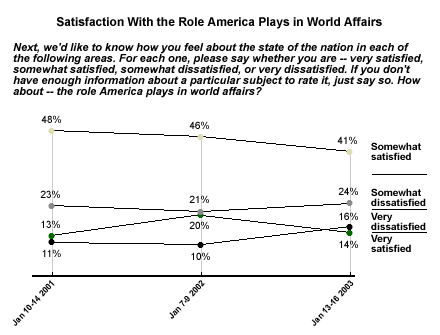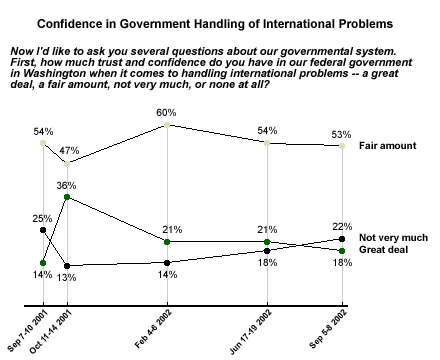The level of Americans' satisfaction with America's role on the world stage has declined substantially in the past year. According to a January 2003 Gallup Poll*, just over half of Americans (55%) claim to be satisfied with the role the United States plays in world affairs, down from 66% who felt this way at this time last year, and 61% in 2001. This decline in satisfaction is attributable in part to America's war on terrorism being overshadowed lately by more complex foreign policy issues -- namely the threat of confrontation with Iraq and, to a lesser degree, North Korea.

At this time last year, American sentiment on foreign affairs was riding high following rapid progress in the war against terrorism, including the successful toppling of the Taliban regime in Afghanistan. Since that time, however, any remnant of a post-Sept. 11 rally effect has faded away. In addition, tensions with Iraq have escalated dramatically over the past year, and news of North Korea's nuclear capabilities has the American public on edge.
Not surprisingly, members of the party occupying the White House tend to rate measures of U.S. stature more favorably than those of the other major party. Currently, seven in 10 Republicans (70%) say they are satisfied with the U.S. role, compared with 45% of Democrats. Half of independents are satisfied.
Dwindling Trust in U.S. Foreign Policy
Results of other Gallup Polls conducted during the past several months reinforce the finding that American trust in U.S. foreign policy has eroded since Sept. 11, 2001. In September 2002**, only 18% of Americans expressed a "great deal" of trust and confidence in the federal government's ability to handle international problems. While this is slightly higher than the pre-Sept. 11 measure of 14%, it represents a notable decline from the high of 36% in October 2001 and a slight decline from 21% in June 2002.

Bottom Line
Although a majority of Americans (52%) are still in favor of sending ground troops to Iraq to remove Saddam Hussein from power, other poll results indicate Americans' general confidence in the country's role in world affairs is weakening as the threat of war looms larger. Given that fact, it will be interesting to see if a new rally effect will emerge should the United States actually go to war with Iraq.
*Results are based on telephone interviews with 1,000 national adults, aged 18 and older, conducted Jan. 13-16, 2003. For results based on the total sample of national adults, one can say with 95% confidence that the margin of sampling error is ±3%.
**Results are based on telephone interviews with 1,004 national adults, aged 18 and older, conducted Sept. 5-8, 2002. For results based on the total sample of national adults, one can say with 95% confidence that the margin of sampling error is ±3%.
